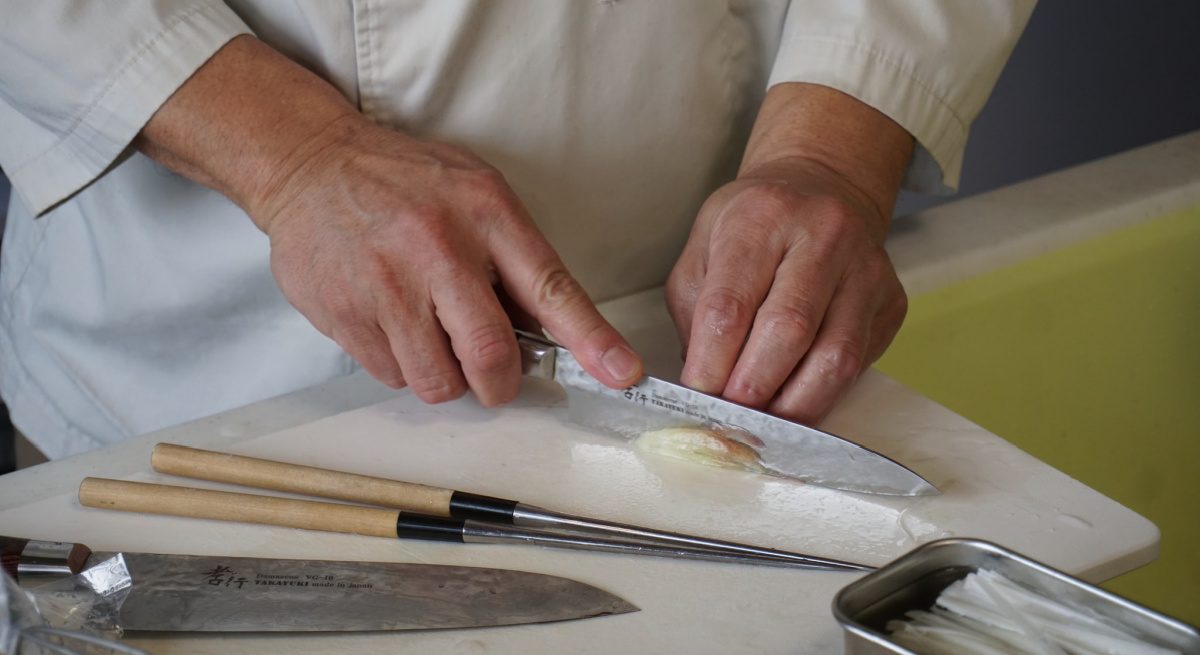The Importance of NSF Certification for Restaurant Tools and Knives
3 Min Read By Cassie Donnelly
In the restaurant industry, sanitation and health safety have always been held at the utmost importance – and that has been even more so through the past year. National and international organizations, health codes, and other rules and regulations hold restaurants to high standards of cleanliness to prevent foodborne illnesses, cross contamination, and any other spread of germs and bacteria. In 2011, the U.S. government created the Food Safety Modernization Act, which transformed the nation’s food safety system by shifting the attention from responding to foodborne illness to preventing it. This Act prompted even more eyes to focus on the food processing and food service industries to ensure sanitation.
The global, independent organization that was formed in 1944, the National Sanitation Foundation (NSF), is dedicated to protecting and improving global human health. Manufacturers, regulators, and consumers look to the organization to facilitate the development of public health standards and provide certifications that help protect food, water, consumer products and the environment. The NSF has a standards team that facilitates the development of public health standards, and a service team that test, audit, and certify products and services – which brings us to NSF Certification. According to the NSF, “NSF testing, auditing and certification services assure suppliers, retailers, regulators and consumers that an independent organization has reviewed a product or system to comply with specific standards for safety, quality, sustainability or performance.”
Companies seek NSF certification for many reasons, but the top three reasons according to NSF are to:
- Demonstrate compliance with national or international standards and regulations
- Demonstrate independent validation and verification of their commitment to safety and quality
- Increase credibility and acceptance with retailers, consumers and regulators
Most products that receive the certification bear the NSF mark on their packaging to help buyers make educated purchases. The certification comes after comprehensive formulation and material reviews as well as testing and facility inspections. Each NSF certification process is specific to the product, process or service being certified and the type of certification, but generally follows the below seven steps:
- Application and information submission
- Product evaluation
- Product testing in lab
- Manufacturing facility inspection, production confirmation and product sampling
- Test results review and acceptance
- Contract signed and products listed
- Annual plant inspection and retesting
There are many different industries that have products and tools that are NSF certified, including automotive and aerospace, building and construction, health, water and food. At OLFA® North America, our products need to bear the NSF mark for the food processing and food service industries. We understand why it is important for us to make, and restaurants to use, NSF certified tools and products.
Many products in the food industry can be NSF certified, including food equipment, water heaters, commercial refrigerators and storage freezers, manual food and beverage dispensing equipment, oven mitts, tools used around food and prep areas, and more.
While utility and safety knives are one of the handiest tools in the food service industry – to open meat packages, inventory boxes, or shrink-wrapped cases or effortlessly cut zip ties and other thick plastic – they are typically unsafe to use around food as they cannot be properly sanitized. It wasn’t until OLFA® was approached by a company in the food processing industry about safety knives, and whether or not they could be cleaned and sanitized, that we realized it was something that should be explore further.
For our safety knives to be cleaned and sanitized effectively, they had to be made of materials that wouldn’t deteriorate, rust, or get food or packaging materials stuck in them. As we started doing more research on the topic, it was clear that rules resulting from NSF required changes for all sorts of tools that were used in the food industry. As OLFA approached many food industry establishments and companies trying to sell our safety knives, the first thing we were always asked was if they were NSF certified. We learned this was an industry standard and the knives could not be used until they bared the NSF mark. Thus began the process to get them certified.
After paying the fee, applying, and sending in our knives to get tested by NSF’s service team, two of our safety knives are now NSF certified. Because the safety knives have an open channel design, and are made with materials that are non-toxic, durable, and resistant to corrosion – like stainless steel blades – they are able to be safely handled in the food service industry and can be easily sanitized.
If you’re interested in learning more about NSF certification and how to check to see if the products and tools you are using pass the test, check out www.nsf.org.


